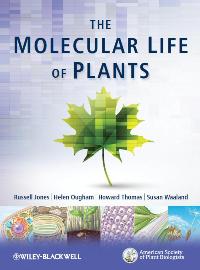The Molecular Life of Plants

The cover of The Molecular Life of Plants
13 February 2013
The Molecular Life of Plants by Russell Jones, Helen Ougham, Howard Thomas and Susan Waaland, an innovative new textbook designed to introduce undergraduate students to contemporary experimental plant biology, has been written by authors with strong roots in Wales.
Russell Jones, Helen Ougham and Howard (Sid) Thomas are all doctoral graduates of Aberystwyth University. Helen and Sid are based in the Institute of Biological, Environmental and Rural Sciences (IBERS) at Aberystwyth University.
Russell, a native of Dyserth in Denbighshire, is Professor of the Graduate School in the Department of Plant and Microbial Biology at University of California, Berkeley and until recently was Chair of the IBERS External Advisory Board.
Russell and Helen are Welsh speakers and many of the transatlantic authorial conferences were conducted in the language of Russell’s forefathers.
The book continues the long tradition of Aberystwyth as a world centre of plant science research and teaching. The Molecular Life of Plants is a co-publication by the American Society of Plant Biologists (the leading international body representing plant scientists worldwide) and John Wiley & Sons Ltd.
In writing the book, Russell, Helen and Sid were joined by distinguished academic and teacher Dr Susan Waaland of the University of Washington. An outstanding feature of the book is the quality and richness of the illustrations, the work of artist Debbie Maizels.
The Molecular Life of Plants uses the plant life cycle as a framework to discuss the key aspects of plant function from seed to seed and reflects the dramatic changes made possible in biology by the revolution in molecular genetics. The book is organized into six sections.
Origins includes a primer on plant structure and reproduction and covers the basics of cellular chemistry, plant genomes and cell structure.
Germination describes the cellular events crucial for germination, the mobilization of stored food reserves and how these reserves are metabolized to provide energy and carbon skeletons for the developing plant.
Emergence deals with the roles of light in seedling growth and development.
Growth covers hormone synthesis and action, the cell cycle and meristems, cell elongation, embryogenesis, vegetative development and nutrient acquisition.
In Maturation the topics of long-distance transport and plant-environment interactions are discussed.
Finally Renewal describes the development of flowers, seeds, fruits and resting structures, dormancy mechanisms, and senescence, ripening and death in the terminal stages in the life of a plant.
The print version of The Molecular Life of Plants is linked to extensive online resources which can be accessed at www.wiley.com/go/jones/molecularlifeofplants. This student companion website contains electronic versions of all the figures and tables contained within the book.
Professor Wayne Powell, Director of the Institute of Biological, Environmental and Rural Sciences welcomed the publication of the textbook. He said: “In the 21st Century, the world faces unprecedented demands for food, feed, fibre and fuel, requiring fundamental and practical understanding of the lives and functions of the plants on which we all depend. The Molecular Life of Plants, representing the view from Aberystwyth and the USA, is a major contribution to meeting these needs.”
The Molecular Life of Plants (766pp) was published in October 2012 and is available in hardback (price £95), paperback, Wiley E-Text and E-book formats.
IBERS is an internationally recognised centre of excellence for the study of biological, environmental and rural sciences.
It is a unique institution within Higher Education the UK which draws on academic expertise to undertake ground-breaking research to improve agricultural practices and to inform policy. The extensive range of work undertaken covers teaching, research, enterprise and knowledge transfer which enables IBERS to play a valuable role in the global drive to tackle some of the world’s most urgent challenges.
IBERS was established in April 2008 following the merger of the Institute of Grassland and Environmental Research (IGER),formerly part of the Biotechnology and Biological Sciences Research Council (BBSRC), with Aberystwyth University. IBERS receives strategic funding for research from the BBSRC, and benefits from financial support from the Welsh Government, DEFRA and the European Union.



